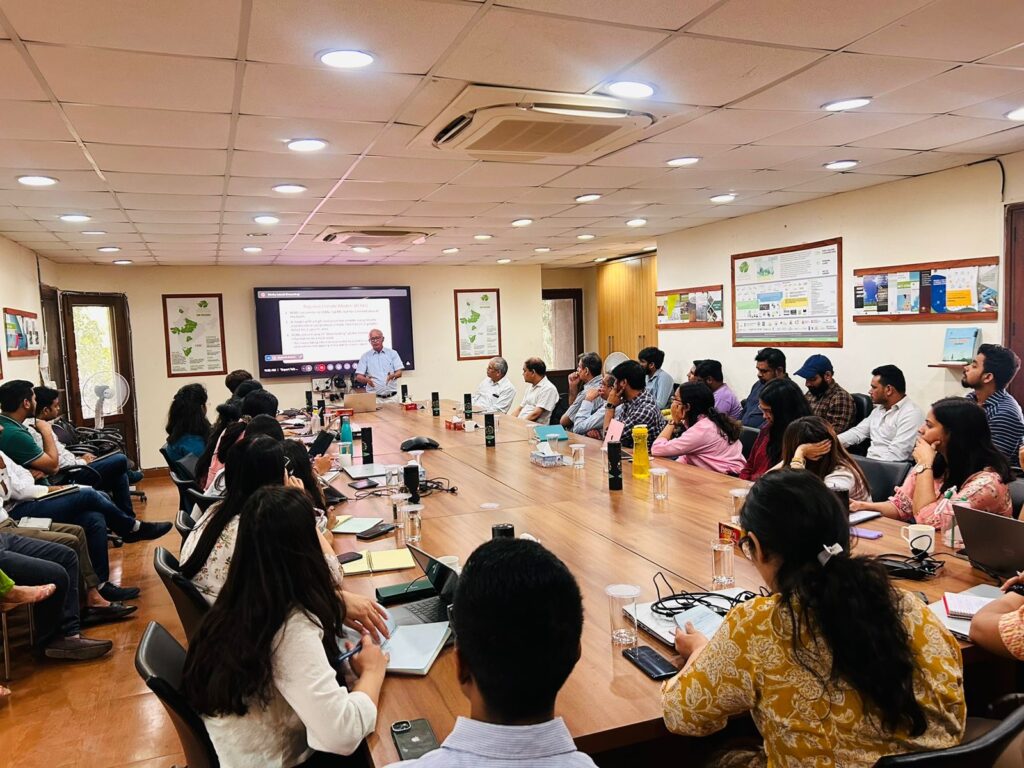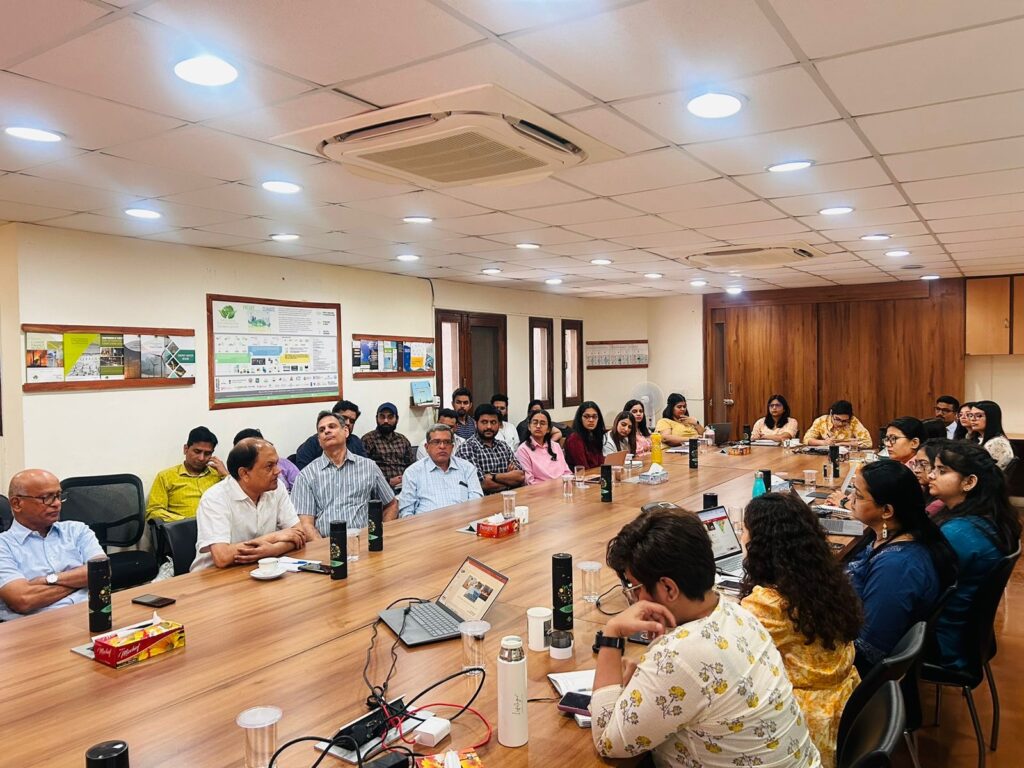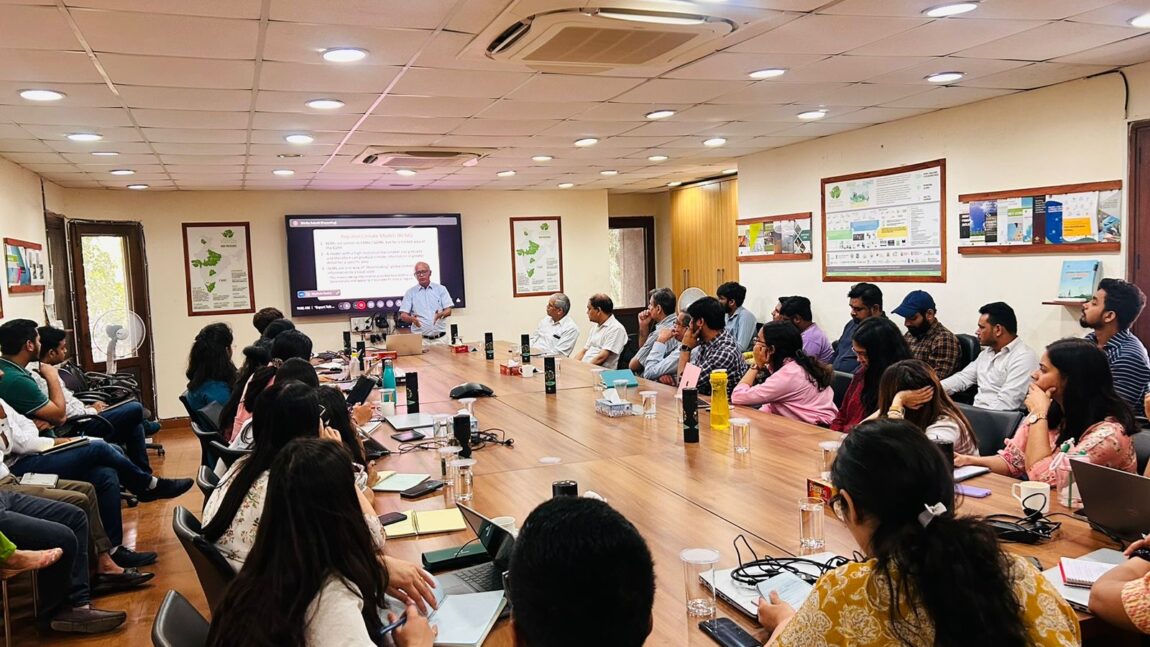3rd May 2024 | Vasudha Foundation Office, New Delhi


The workshop and expert talk were held in hybrid mode (in-person & virtual). All Vasudha team members from offices in Delhi, Bangalore, Lucknow and Ahmedabad attended the session.
Speakers:
- Shivika Solanki, Senior Manager, Vasudha Foundation
- Tejaswani Eregowda, Senior Manager, Vasudha Foundation
- Monika Chakraborty, Assistant Manager, Vasudha Foundation
- Rahul Menon, Manager, Vasudha Foundation
- Rini Dutt, Associate Director Climate Policy, Vasudha Foundation
- Prof. N.H Ravindranath, Retired Professor, IISc
- Ajay Raghava, Joint Director, Ministry of Environment, Forest and Climate Change, Government of India
The main objective of the workshop was to provide Vasudha team members with an overview on GHG emissions estimation. This was followed by expert talks on climate science, climate policy formulation, overview on global climate negotiations and international reporting. The session began with an introduction to IPCC Guidelines for National Greenhouse Gas Inventories that helped in setting the context for the workshop.
The following key points were highlighted during the session:
- An overview was provided of 5 different volumes of IPCC reports and their respective chapters that covered source categories, methodology approaches, emission factors and other key concepts.
- The discussion also explored the various worksheets or templates parameters/components that are important for GHG estimation.
- Key economic categories/sectors for GHG estimation were discussed involving detailing parameters specific to each sector.
- Diverse sources for obtaining datasets (activity data) include National reports, Dashboards, and Government websites.
- Additionally, emphasis was placed on the significance of conducting preliminary research on the geography of the region and identifying nodal officers from specific departments to acquire relevant data sets.
Expert talk on Climate Policy Formulation, Overview on Global Climate Negotiations and International Reporting
Dr. N. H. Ravindranath (Retired Professor, IISc), a key contributor to India’s NATCOMs and IPCC Author
The following highlights emerged from this session:
- Key concepts around climate change science and policy.
- Understanding historical climate trends, that provide the baseline for climate modelling.
- Climate models generate a complete picture of the Earth’s climate as an output. The output from these models drives forward climate science, helping policymakers/researchers understand how human activity is affecting global climate.
- Different types of climate models were explained, for instance, General Circulation Models (GCMs), Earth System Models (ESMs) and Regional Climate Models (RCMs) like CORDEX which provide higher resolution for specific areas with greater detail.
- Climate modelling has various constraints that include limited precision, dependence on the quality of input forecasts, and the challenge of projecting future scenarios since there are many variables that need to be considered.
- Discussions focused on impact models to assess climate change impacts and socio-economic impacts. These models can assess inter-sectoral impacts on water, agriculture and forest which might be beneficial in formulating climate action plans at national and sub-national levels.
- The lack of gridded inventory is posing research challenges across sectors.
- As numerous studies highlight the declining agricultural productivity across various agro-climatic zones in India, there is an increasing emphasis on implementing mitigation and adapting strategies, and policies in alignment with India’s National Determined Contributions. It is important to establish adaptation and mitigation co-benefits of these strategies.
Mr. Ajay Raghava, Joint Director, Ministry of Environment, Forest and Climate Change (MoEFCC), Government of India
The following key points were highlighted during the session:
- Insights on India’s initiatives and projects related to climate change.
- MoEFCC’s major role in addressing climate change includes international negotiations, formulating adaptation-oriented missions/schemes, National reporting and other studies.
- Major national initiatives discussed include National Adaptation Fund, the Climate Change Action Plan, and the All India Coordinated Project on National Emission for Decarbonization.
- India’s position in climate negotiations, being part of G77 and Like-Minded Developing Countries (LMDC).
- The challenges of emissions growth due to India’s infrastructure development in sectors like cement, steel, roads and aviation were also highlighted.
- Discussions focused on the critical role of climate action plans to coordinate at various levels of governance to achieve the net zero goals.
- Stressed upon the need for India’s own GHG emission models and policy research given India’s geographical diversity to shape strategies like the next NDC for 2035 targets.
The session concluded with an interactive Question and Answer session between the Speaker and the Vasudha team that provided fruitful insights into climate change policy and global negotiations.




